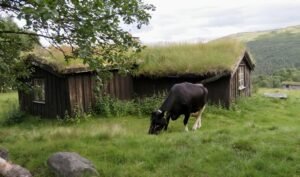
Exploring the Mighty Gods of Norse Mythology
Have you ever wondered about the gods who ruled over the ancient realms of Norse mythology? From the thunderous might of Thor to the wisdom of Odin and the enchantment of Freyja, these powerful deities shaped the world of Norse mythology and continue to captivate our imagination to this day. So, who were these gods of Norse mythology? What secrets did they hold? Let’s embark on a journey to unravel the tales of these mighty beings who resided in Asgard.
Table of Contents
ToggleKey Takeaways:
- Discover the awe-inspiring might of Thor, the God of Thunder and Protector of Asgard.
- Unravel the mysteries surrounding Odin, the Allfather and King of the Norse Gods.
- Explore the realm of Freyja, the Goddess of Love, Beauty, and Magic.
- Encounter Loki, the mischievous and cunning trickster god of Norse mythology.
- Uncover the captivating tales that make up the intricate tapestry of Norse mythology.
Thor – God of Thunder and Protector of Asgard
Unleash the might and power of Thor, the renowned Norse deity who wields the thunderous hammer, Mjolnir. Son of Odin, Thor stands tall as one of the most prominent gods in Norse mythology, revered for his heroic feats and unwavering dedication to the realm of Asgard.
Thor exemplifies brute strength, unparalleled courage, and a deep sense of justice. His thunderous hammer grants him the ability to command storms and lightning, making him the ultimate wielder of thunder. With every strike of his mighty weapon, Thor defends Asgard from enemies and giants, ensuring the safety of the gods and the realm they call home.
Thor’s battles with the giants showcase his indomitable spirit and unyielding determination. Whether facing off against the formidable Jotunheim or wrestling the Midgard Serpent, Thor’s exploits have become legendary tales deeply woven into the fabric of Norse mythology.
As the protector of Asgard, Thor diligently guards the realm and its inhabitants from external threats. His devotion to safeguarding the realm showcases his unwavering loyalty and his willingness to put himself in harm’s way to preserve peace and harmony among the gods.
“By the power of Mjolnir, I shall stand as the thunder that strikes fear into the hearts of our enemies!”
Thor’s iconic status as the God of Thunder represents not only his physical might but also his role as a symbol of power and protection. The resounding thunderclaps that accompany him serve as a reminder of his presence and his commitment to ensuring the wellbeing of Asgard.
Join us as we delve further into the realm of Norse mythology, unraveling the captivating stories and insights into the gods who shaped this enchanting world. Stay tuned for our next section, where we will explore the realm of Odin, the Allfather and King of the Norse Gods.
Odin – Allfather and King of the Norse Gods
Enter the enigmatic realm of Odin, the wise and powerful Allfather who ruled over the gods in Asgard. As the supreme deity in Norse mythology, Odin’s presence loomed large over the mythic landscape, embodying wisdom, divine knowledge, and the complexities of human existence. Known by various names, including the King of Asgard, Father of the Slain, and the Wanderer, Odin commanded respect and reverence from his fellow gods.
Asgard, the celestial realm ruled by Odin, served as the dwelling place for the gods of Norse mythology. Norse gods hailed from this majestic realm, which was connected to mortal lands through the mythical Bifrost Bridge. As the ruler of Asgard, Odin’s wisdom and leadership guided the gods in their pursuit of justice, order, and protection of the cosmos.
Odin’s knowledge was vast and boundless, as he sought wisdom through various means, including sacrificing one of his eyes to drink from the Well of Mimir. This sacrifice granted him profound insight into the past, present, and future, allowing him to make informed decisions and steer the course of fate.
Alliances played a crucial role in Odin’s journey. He formed alliances with other powerful entities, such as the giants and dwarves, to gain access to their knowledge and resources. These alliances enabled Odin to acquire treasures like the magical ring Draupnir, the spear Gungnir, and the enchanted gold of the dwarves.
“Odin’s ultimate sacrifice in pursuit of wisdom and knowledge embodies the depth of his character and his unyielding determination to protect Asgard and its inhabitants.”
Odin’s selflessness was evident in his ultimate sacrifice to gain even greater wisdom. In a compelling act, he hung himself from the World Tree, Yggdrasil, for nine days and nights without sustenance or water. This self-inflicted ordeal granted him mastery over the runes, ancient symbols of power and wisdom.
Through his divine insight and strategic alliances, Odin’s influence extended beyond the realm of gods. He was known to meddle in the affairs of mortals, providing guidance to chosen heroes and influencing the outcomes of battles. Odin’s restless pursuit of knowledge and wisdom ensured his status as the Allfather and guided the gods of Norse mythology.
| Odin – Allfather and King of the Norse Gods | |
|---|---|
| Realm and Title | Asgard, King of Asgard |
| Key Attributes | Wisdom, divine knowledge, leadership |
| Significance | Ruler of the gods, protector of Asgard, seeker of wisdom |
| Notable Alliances | Giants, dwarves |
| Ultimate Sacrifice | Hanging himself from the World Tree for nine days and nights to gain wisdom |
Freyja – Goddess of Love, Beauty, and Magic
Welcome to the enchanting realm of Freyja, the captivating goddess who holds sway over love, beauty, and magic. In Norse mythology, Freyja is revered as one of the most important deities, embodying the essence of femininity and grace.
Freyja is closely associated with love and desire, representing the passionate and romantic aspects of human existence. She is known to possess a magnetic charm and captivating presence that enchants both mortals and gods alike. With her compassionate nature, she brings comfort and solace to those who seek her guidance.
In addition to her role as the goddess of love, Freyja is also associated with beauty and fertility. She is often depicted wearing a stunning necklace called Brísingamen, which is said to enhance her allure and radiance. As the patron of fertility and motherhood, Freyja holds a cherished position in the hearts of those seeking blessings for family and children.
But Freyja’s influence extends beyond matters of the heart. She is also a powerful practitioner of magic, with an extensive knowledge of the mystical arts. Being a member of the Vanir, one of the two main groups of Norse gods, Freyja’s magical abilities are renowned throughout the realms. With her expertise in divination and her connection to the hidden aspects of the cosmos, she offers insight and guidance to those who seek to understand the mysteries of the universe.
“Freyja’s captivating presence and mystical abilities make her a beloved figure in Norse mythology. She reigns as the leader of the Valkyries, guiding fallen warriors to the afterlife and ensuring their honorable place in Valhalla.”
As the leader of the Valkyries, Freyja holds a position of great reverence and authority. The Valkyries are divine maidens tasked with selecting fallen warriors and guiding them to the halls of Valhalla, a majestic realm reserved for heroes who die in combat. It is through Freyja’s wisdom and leadership that these brave warriors find eternal glory in the afterlife.
The Symbolism of Freyja
Freyja’s prominent status in Norse mythology and her connection to various aspects of life have led to the adoption of her symbols in modern representations. The image of a cat is often associated with Freyja, as she is said to have a deep affection for these animals. Cats are seen as her sacred companions, embodying her mysterious and independent nature.
Furthermore, Freyja’s connection to the natural world is symbolized by the presence of falcons, which represent her ability to soar high above and see beyond mortal realms. The falcon is associated with wisdom, foresight, and the ability to traverse the realms of existence.
In the realm of love and beauty, the petals of the primrose flower are often linked to Freyja. This delicate flower, with its vibrant colors and gentle fragrance, represents her role as the goddess of love and the blossoming of relationships.
It is through these symbols that Freyja’s influence continues to be felt in the modern world, reminding us of the enduring power and significance of love, beauty, and magic.
Loki – The Mischief-Maker and Trickster God
Meet Loki, the cunning and mischievous god of Norse mythology who never ceased to challenge the boundaries of Asgard. With his quick wit and deceptive nature, Loki has left an indelible mark on the tales of the gods.
Loki is known for his complicated relationships with other gods, often manipulating situations to his advantage. His antics have led to both chaos and pivotal moments in mythological history.
One of Loki’s most notable ventures is his involvement in the theft of Thor’s hammer, Mjolnir. Using his shapeshifting abilities, Loki transformed into a fly and caused distractions, enabling the hammer to be stolen. This event not only showcased Loki’s cunning nature but also highlighted the complex dynamics between him and Thor.
“Loki has always been a representation of unpredictability and trickery, an essential character in the tapestry of Norse mythology.” – Professor Erik Johnson
The god Loki also played a crucial role in the death of the beloved god Baldr. Through deceit and manipulation, Loki orchestrated Baldr’s demise, forever altering the dynamic between the gods and sealing his fate as a trickster figure.
Loki’s Actions and Their Consequences
While Loki’s actions often brought excitement and intrigue to the stories, they also had severe consequences. Loki’s tricks and schemes resulted in dire consequences for both gods and mortals alike.
One such consequence was the binding of Loki. In the aftermath of Baldr’s death, the gods captured Loki and bound him with the intestines of his son. This torturous punishment reflected the outrage and retribution for his misdeeds.
In addition, Loki’s role in the events leading up to Ragnarok, the apocalyptic battle between gods and giants, showcases the magnitude of his impact on Norse mythology. His actions directly contributed to the destruction of the world as it was known, further solidifying his influential presence.
| Loki’s Key Characteristics | Key Episodes |
|---|---|
|
|
Through his cunning and unpredictable nature, Loki remains an intriguing and multi-faceted character in Norse mythology. His presence continues to captivate audiences, showcasing the complexity of the gods and the intricacies of their relationships.
Conclusion
In conclusion, the gods of Norse mythology paint a vivid tapestry of legends and tales that continue to captivate and intrigue. Through the thunderous power of Thor, the wisdom of Odin, and the allure of Freyja, these deities shape the realms of Asgard and inspire awe in the modern world.
Thor, with his mighty hammer Mjolnir, stands as a symbol of strength and protection. Odin, the Allfather, exemplifies wisdom and sacrifice. Freyja, the goddess of love and magic, brings beauty and enchantment to the Norse pantheon.
Exploring the vast world of Norse mythology grants us a glimpse into the rich and complex narratives of these mighty gods. Whether in ancient sagas or modern interpretations, their stories continue to resonate with audiences, fueling the imagination and fostering a deeper understanding of the human experience.
FAQ
Who were the gods of Norse mythology?
What is Norse mythology?
Who was Thor?
Who was Odin?
Who was Freyja?
Who was Loki?
If you want to learn Norwegian, you can register for classes here. We look forward to hearing from you and helping you become fluent in Norwegian.





